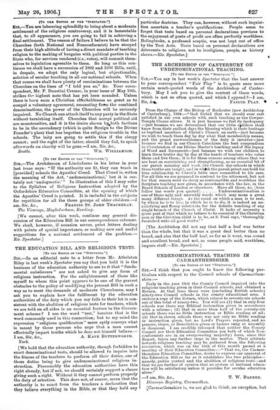THE EDUCATION BILL AND RELIGIOUS TESTS.
rTO THE EDITOR OF THE " SPEcraTou."] Snt,—In an editorial note to a letter from Mr. Athelstan Riley in last week's Spectator you say that you hold it is the business of the education authority to see to it that " funda- mental unbelievers " are not asked to give any form of religious instruction. For the enlightenment of those like myself to whom this point appears to lie one of the gravest obstacles to the policy of modifying the present Bill in such a way as to meet the demands of moderate Churchmen, may I ask you to explain how the fulfilment by the education authorities of the duty which you say falls to their lot is con- sistent with the abolition of religious tests for teachers, which we are told on all sides is an essential feature in the Govern- ment scheme P I use the word " test," because that is the word commonly used in this connection; but to my mind the expression "religious qualification " more aptly conveys what is meant by those persons who urge that a man cannot effectually impart truths which be does not himself believe.--:
[We hold that the education authority, though forbidden to exact denominational tests, should be allowed to inquire into the fitness of the teachers to perform all their duties, one of those duties being to give undenominational religious in- struction. Presumably the education authorities have this right already, but if not, we should certainly support a clause giving such a right. Without it they cannot perform properly the duty of selection. This does not, of course, mean that the authority is to exact from the teachers a declaration that they believe everything in the Bible, or that they hold any
particular doctrine. They can, however, without such inquisi- tion ascertain a teacher's qualifications. People seem to forget that tests based on personal declarations previous to the enjoyment of posts of profit are often perfectly worthless. Bolingbroke, a professed sceptic, was not kept out of office by the Test Acts. Tests based on personal declarations are deterrents to religious, not to irreligious, people, as history shows.—ED. Spectator.]










































 Previous page
Previous page